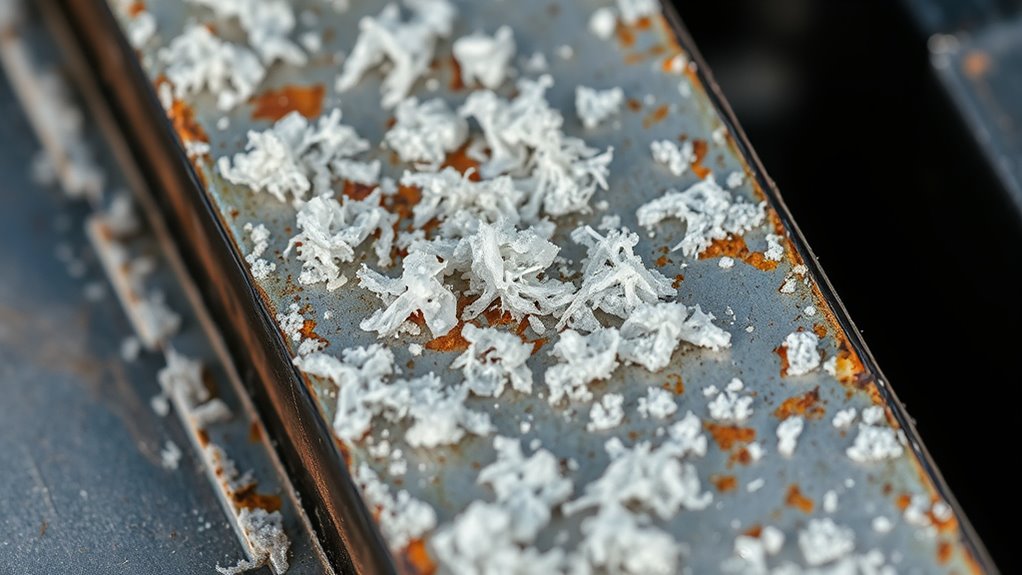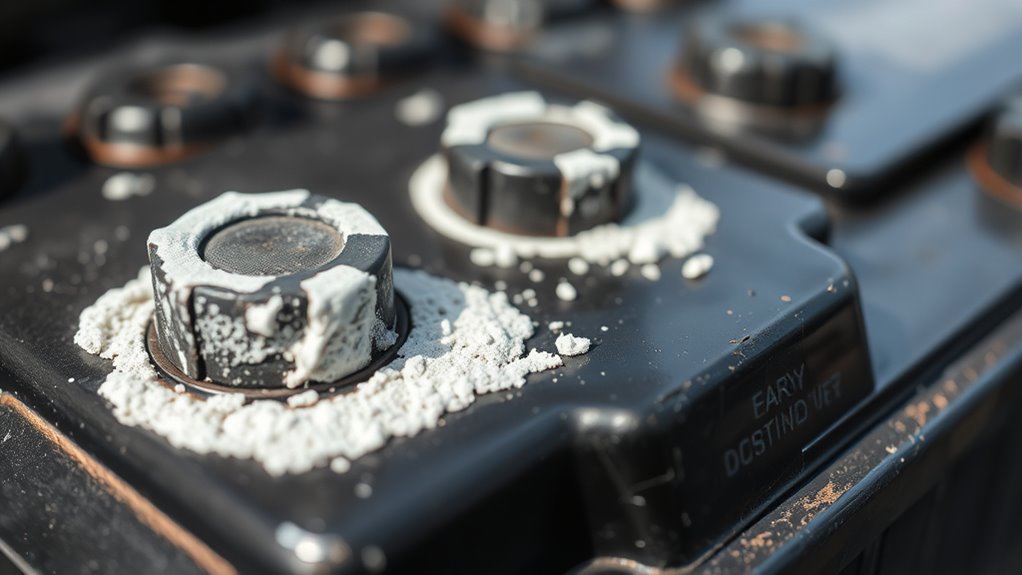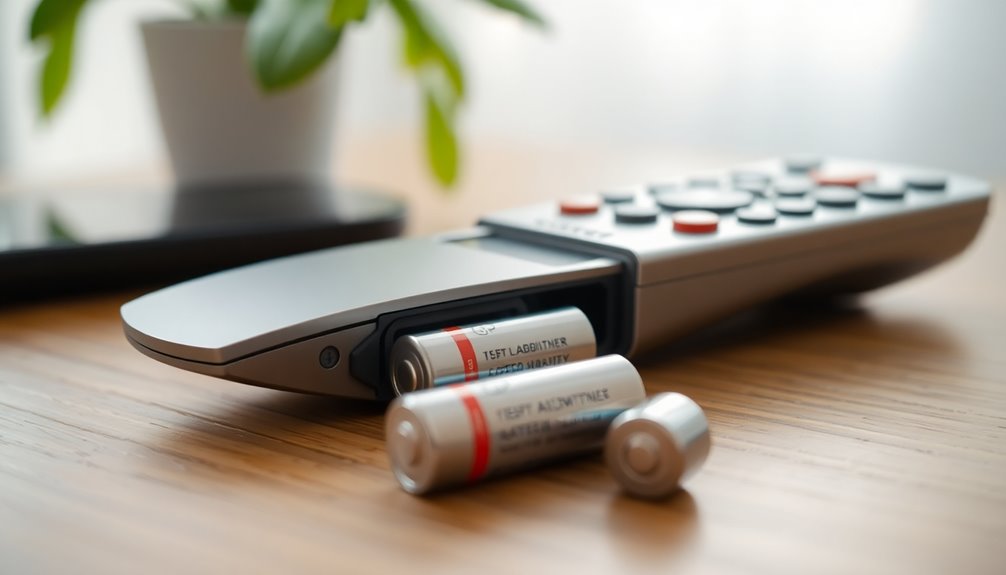Early sulfation symptoms can be subtle but serious signals that your body’s cells are under stress. You might notice fatigue, mental fog, joint pain, or unexplained health issues. Catching these signs early helps prevent more serious health problems down the line. Proper hydration, balanced minerals, and avoiding toxins support your detox pathways. Stay aware of these clues—if you keep an eye out, you’ll discover how to keep your health and energy ideal.
Key Takeaways
- Recognize early signs like fatigue, mental fog, and joint pain to address sulfation issues promptly.
- Excess sulfation causes cellular stress, leading to symptoms that mimic detox or mineral imbalance problems.
- Supporting detox with hydration, minerals, and supplements helps prevent sulfate buildup.
- Regular health checks and balanced habits resemble proper battery care, preventing irreversible damage.
- Early intervention and consistent support can reverse or prevent serious health complications from sulfation.

Have you ever wondered if your body’s symptoms could be linked to sulfation issues? It might sound unusual, but just like a vehicle’s battery can suffer if not properly maintained, your body can experience similar problems when sulfation isn’t managed correctly. Recognizing early signs of sulfation symptoms can make a significant difference, especially when it comes to maintaining your health and your battery’s lifespan. Think of your body as a complex system that relies on proper detoxification and mineral balance, much like a battery depends on good battery maintenance and correct charging techniques to stay excellent.
Just like a vehicle’s battery needs proper care, your body requires balanced detox and mineral support.
When sulfation builds up, it can cause fatigue, mental fog, joint pain, or other health issues that seem disconnected but are actually signs of cellular stress. If you’re noticing these symptoms, it’s a good idea to evaluate how you’re supporting your body’s detox pathways. Just as with a car battery, neglecting proper charging techniques, such as overcharging or undercharging, can lead to irreversible damage. Similarly, poor nutrition, dehydration, or exposure to toxins can hinder your body’s ability to process sulfates properly, leading to buildup and symptoms.
Battery maintenance involves regular checks and correct charging techniques to ensure longevity. The same applies to your body. Staying hydrated, eating mineral-rich foods, and avoiding excessive processed foods help support the detox process. Supplements like magnesium or sulfate-rich foods such as Epsom salts can assist in reducing sulfation. Additionally, understanding how color accuracy impacts your health can guide you in choosing the right approaches to improve your overall wellbeing. If you’re experiencing persistent symptoms, it’s worth considering whether your body’s natural detox mechanisms are overwhelmed. Properly supporting these mechanisms can prevent the escalation of symptoms and promote overall wellness.
Just as a battery benefits from a balanced charging approach—avoiding rapid, excessive charges or letting it drain completely—your body needs consistent, gentle support. Avoiding sudden stressors, managing inflammation, and maintaining a steady intake of necessary nutrients are key. When you understand the importance of correct charging techniques for your battery, you realize that a similar principle applies to your health: balance and consistency are essential. Recognizing early sulfation symptoms allows you to intervene before more significant health issues develop, just as timely battery maintenance prevents costly replacements.
In essence, paying attention to your body’s signals, supporting its detox pathways, and practicing good health habits mirror the principles of battery maintenance and charging techniques. Catching sulfation symptoms early isn’t just about feeling better; it’s about safeguarding your long-term health and ensuring your body’s systems run smoothly. The sooner you act, the better your chances of reversing or preventing serious problems—just like maintaining a battery extends its lifespan and performance.
Frequently Asked Questions
Can Sulfation Occur in All Types of Batteries?
Not all batteries are equally vulnerable to sulfation. It primarily affects lead-acid batteries because of their chemistry, where sulfate crystals form on the plates if the battery isn’t maintained properly. To prevent sulfation, you should focus on sulfation prevention techniques like regular charging and avoiding deep discharges. While other types like lithium-ion are less prone, understanding your battery chemistry helps you protect your investment and extend its lifespan.
How Quickly Can Sulfation Damage a Battery?
Sulfation can damage your battery quite quickly if you neglect proper maintenance routines. The speed depends on your battery chemistry and how often you check and maintain it. For lead-acid batteries, damage can start within days of neglect, especially if left discharged. Regular charging and monitoring help prevent sulfation from progressing rapidly, extending your battery’s lifespan and ensuring reliable performance. Stay proactive with maintenance to avoid costly replacements.
Are There Preventive Measures to Avoid Sulfation?
You can prevent sulfation by maintaining proper battery care. Focus on good battery maintenance, such as regularly checking the electrolyte levels and keeping terminals clean. Additionally, follow correct charging practices—avoid overcharging or letting the battery discharge completely. Using a smart charger or charger with a desulfation mode can help prevent sulfation buildup. These steps guarantee your battery stays healthy and performs efficiently longer.
What Is the Cost of Professional Battery Desulfation?
Imagine your battery as a hardworking engine, essential for your daily journey. Professional desulfation can extend its lifespan, but costs vary depending on the battery size and technician fees. Typically, you’ll spend between $50 to $200. Good charging habits prevent sulfation, saving you money on repairs and replacements. Investing in proper maintenance keeps your battery performing at its best, ensuring your vehicle stays reliable and ready for every adventure.
Can Sulfation Be Reversed in Severely Damaged Batteries?
Severely damaged batteries from sulfation can sometimes be reversed, but it depends on the extent of the damage. Proper battery maintenance and sulfation prevention are key to extending battery life. If sulfation has caused significant damage, desulfation methods may help, but they aren’t always effective for severely compromised cells. Regularly monitoring your battery and addressing early signs of sulfation can save you money and prolong its usability.
Conclusion
If you notice your battery’s performance slipping like a fading echo, don’t ignore the signs. Think of sulfation as a stubborn stain slowly creeping across a clear window—blocking your view and draining your power. Catch it early, and you can wipe away the buildup before it hardens into damage. Stay vigilant, and keep your energy flowing bright and strong, like a sunrise after a storm, ready to power your day without interruption.









